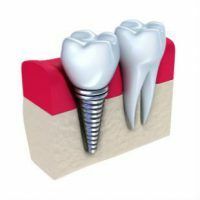
Due to modern achievements in the field of dentistry, patients can restore their teeth qualitatively and comfortably with the help of implantation. Dental prosthetics has not only aesthetic value, but also guarantees a comfortable daily performance of basic vital functions( chewing food, swallowing, breathing, talking with the interlocutor, etc.).Like other operations, this procedure is considered surgical, and therefore has a number of absolute and relative contraindications.
- Absolute
- Relative
- Age
- Complications
- Detection of contraindications
Absolute
Restoration of teeth is completely impossible in the following cases:
- diseases of the cardiovascular, nervous, endocrine system;
- disorders of blood clotting and hemopoiesis;
- chronic kidney and liver diseases;
- alcohol or drug dependence;
- allergy to pain medications;
- malignant tumors;
- diseases of the bone system( due to a decrease in the recovery function of bone tissue implants do not take root);
- autoimmune diseases, for example, thyroiditis, the presence of which leads to a high risk of complications;
- infectious diseases( tuberculosis, hepatitis, meningitis, etc.);
- rheumatic diseases;
- continuous reception of anticoagulants or immunosuppressants increase the probability of rejection of implants;
- paranoia, schizophrenia, dementia, various kinds of neuroses.
Relative
For example, the state of health in diabetes mellitus, severe stress, exhaustion of the body, venereal diseases, poor nutrition can be improved by literate treatment.
Obstacles to the procedure can be extreme sports and dangerous occupations, as they increase the risk of injury. Among the contraindications are smoking as well as smoking more than 20 cigarettes a day, alcoholism.
Relative local contraindications mean the presence of oral diseases that require treatment. First of all, this is a small amount of bone tissue in the area of damage, increased abrasion of teeth, bruxism, an incorrect bite. Anatomical defects or peculiarities of the structure of the jaw can interfere with the operation.
Neoplasms, inflammatory processes observed in the area of the proposed intervention, before fixing the implant require compulsory treatment. In addition, it is necessary to cure all teeth damaged by caries. A conditional ban on dental implantation is inadequate oral hygiene afterwards, which may possibly provoke a prolapse of the prosthesis.
In some cases, the procedure is not possible in a certain period of time. This pregnancy and lactation, acute viral infections and inflammatory diseases, conditions after radiation exposure and radiation sickness. At the end of this period, implants can be installed taking into account the general state of health.
Age
Implants can not be placed for young people from sixteen to twentytwo years, since the formation of the bones of the skeleton is not yet complete. Although this is not an absolute contraindication, one can always find a way out and conduct successful treatment.
Older people also do not always receive implantation. The processes of regeneration of bone tissues are more slowed down, therefore implants also get accustomed, much more slowly, in most cases they are recommended by traditional methods of staking.
to contents ^Complications
As with any surgery, complications are possible after implantation of the teeth. They can be early and late - 2-3 years after installation. Potential problems include damage to the soft tissues of the face, facial artery and nerves, perforation of the nasal cavity, implant rejection, inflammation, and appearance of bone growths. Successful treatment will be subject to certain rules and restrictions, in particular, malicious smoking, the use of large doses of alcohol, heavy physical activity are prohibited.
Another possible complication after implantation of teeth may be periimplantitis. It is an inflammation of the soft( gum) and hard( bone) tissues surrounding the implant. The causes of inflammatory processes: poor or insufficient oral hygiene, improper installation of the prosthesis, improperly designed prosthesis design, which gives an excessive load on the supporting elements.
to contents ^Detection of contraindications
Before the procedure, the dentist examines the oral cavity, assessing the condition of the teeth, the correctness of the bite. A mandatory condition is an x-ray study. To determine contraindications ECG, blood test, if necessary, additional consultations of narrow specialists.
Most often, the patient's pre-treatment and treatment can get rid of many problems or so reduce their influence in order to successfully implant. If contraindications are so significant that they can threaten health, the problem can be solved only by traditional methods of prosthetics.
